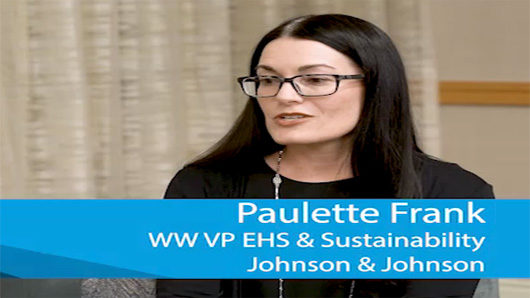
Visit Our Sponsors |
|
|
|
|
|
|
|
|
|
|
|
|
|
|
|
|
|
|
|
|
|
|
|
|
|
|
|
|
|
|
|
|
|
|
|
|
|
|

Paulette Frank, worldwide vice president for environmental health, safety and sustainability with Johnson & Johnson, describes the ambitious supplier sustainability initiative being undertaken by the global healthcare and consumer products giant.
Paulette Frank, worldwide vice president for environmental health, safety and sustainability with Johnson & Johnson, describes the ambitious supplier sustainability initiative being undertaken by the global healthcare and consumer products giant.
SCB: Tell me about Johnson & Johnson.
Frank: Johnson and Johnson is the largest, most broadly based healthcare company in the world. We operate on all continents, with over 135,000 employees, and typically we touch a billion people every day.
SCB: What is Project Phoenix?
Frank: We started it about a decade ago. The focus was on the informal waste sector, which essentially consists of cooperatives of waste recyclers and emerging markets. In Brazil we worked with a recycling cooperative, to bring their working conditions up a standard where they can be a reliable, high-quality supplier in our supply chain. We help with basic things like literacy and computer skills, to create efficiencies in how material flows through their operation.
SCB: What results have you seen to date?
Frank: The result is better and safer working conditions for the people at the cooperative, higher productivity, and higher-quality product coming out at the end. The goal is to create demand for their products so that it becomes a self-sustaining model.
SCB: How do you execute on this? Do you have your own people on the ground in each of these countries? Or do you look to those outside your organization who specialize in this type of effort?
Frank: You have to create an ecosystem of partners who can help you bring this to life. We have local people within J&J who support the cooperative. Our procurement organization in Brazil directs our supplier of packaging material to buy post-consumer recycled content from the cooperative. We also work with local social workers and NGOs to build capacity on the ground. It's about mobilizing all of the players along the value chain to play the role that will sustain the project.
SCB: Where are you concentrating your efforts today?
Frank: Right now we’ve been working primarily in Brazil. Two years ago we tried to bring the model to India, and learned a lot about how local context matters a lot. You can't necessarily get the same job done in the same way in a different cultural setting. There are waste policies supporting the informal sector in Brazil that are different in India.
SCB: It sounds like you're attempting to enable cultural and societal changes that would then trickle down into the way these jobs are done. You're going far beyond just the workplace. That seems like the biggest challenge.
Frank: Doing it at scale is the biggest challenge. Two years ago, we helped set up a nonprofit to a try to scale this model and bring in more companies and resources, so that we could reach even more cooperatives. So far we've been able to reach two on our own in Brazil. It's called the Inclusive Recycling Waste Consortium. We believe that bringing companies together, to pool our resources, is the thing that's going to unlock the impact at scale.
SCB: What kind of a timetable are you looking at?
Frank: I think it can be done relatively quickly if we can bring in more companies and resources, and reach more cooperatives. We've done the fast failing on the model. Some of our expectations in the beginning were set quite high. Our initial goal for the co-op was to get certified under the SA8000 standard for social accountability in areas like working hours, wages, and employment of young persons. It's a very high bar from a labor practices and workplace safety perspective. If companies want to bring post-consumer recycled content into their products and packaging in an emerging market like Brazil, this is the model that can work. But we need to pool our resources so that we can get the scale.
SCB: So you’re blazing a trail.
Frank: Other companies have been doing so as well. Instead of each of us doing it on our own, we’re coming together and pooling our resources so that we can have an even bigger impact.
SCB: Why does J&J care about environmental sustainability?
Frank: We care on a very practical level. To run a business in the 21st century, you have to do it within the constraints of the natural world. The Living Planet Report is put out by the Global Footprint Network every two years, and it's been saying pretty much the same thing. That we’re consuming natural resources faster than the natural environment can replenish them, and that the trajectory is such that by 2030 we’ll need two planet Earths to sustain our current consumption as a worldwide society. Last time I looked, we have just one planet. We have to operate within a one-planet budget.
At a more aspirational level, we want to change the trajectory of health for humanity, and we know that we can't do that without a healthy planet.
RELATED CONTENT
RELATED VIDEOS
Timely, incisive articles delivered directly to your inbox.

